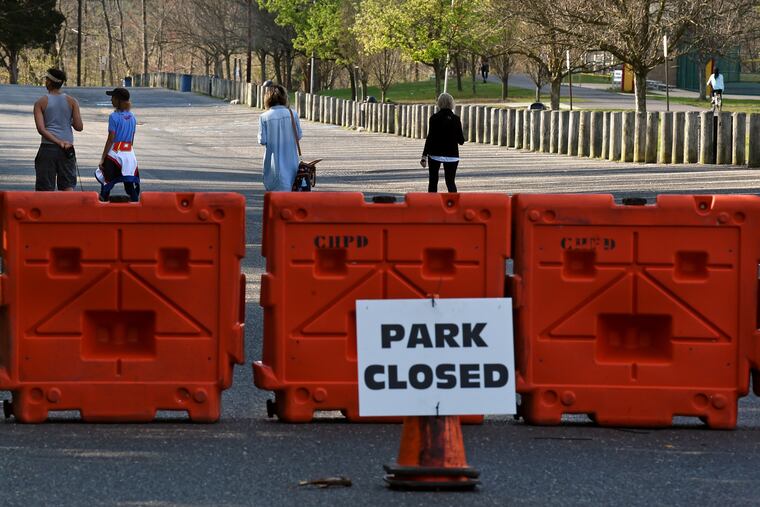N.J. park closures send the right message. Philadelphia should follow. | Editorial
Gov. Phil Murphy's abrupt April 7 order to close most state and county parks has angered many. But it's a step even more necessary due to some indications that a peak in new infections may be approaching.

The New Jersey Outdoor Alliance calls Gov. Phil Murphy’s abrupt Tuesday order to close most state and county parks “ridiculous.” Some Republican legislators and a GOP gubernatorial candidate want Murphy, a Democrat, to reconsider. But the governor’s refusal to budge sends a strong message at exactly the right time.
Preliminary signs that the relentless rise of coronavirus cases in the Garden State and elsewhere may soon level off is not a signal to retreat from the very measures contributing to the statistical improvements. New Jersey’s example is one that Philadelphia, where groups of vulnerable people continue to endanger themselves and others by gathering in public, ought to follow.
It’s a painful irony that one of the few sources of solace available to us during this crisis — getting out of the house to enjoy nature — also must be limited. But once-relaxing trails in urban and suburban parks throughout the region have become crowded with other solace seekers, some of them littering and defecating in these beloved public spaces. A surge in crowds after Pennsylvania and other jurisdictions imposed stay-at-home restrictions led the National Park Service to close Valley Forge National Historical Park.
Being outdoors may seem an inherent, even effortless, form of social distancing. But crowds make it difficult for people to observe the six-foot-apart guideline outdoors, as well as indoors. It’s also worth noting that some research raises questions about whether six feet is sufficient.
Mayor Jim Kenney’s March 22 “stay-at-home” order prohibits any gathering of any size outside the home. It followed the mayor’s March 19 order closing playgrounds and basketball courts citywide. These restrictions have frequently been ignored, and many of Philly’s more than 700 neighborhood basketball courts continue attracting players to pickup games. Work crews are changing locks, repairing fences, and removing rims from basketball courts.
As for enforcement, Philadelphia Police Commissioner Danielle Outlaw says officers on the street have to be practical and “pick their battles.” Other city officials point out that Philly already is having a problem keeping people away from facilities that are officially closed, making it difficult to see the value of closing parks, too. The city is, however, looking at the possibility of closing roadways inside big parks, such as Fairmount and FDR.
If it’s difficult for Center City residents to imagine Rittenhouse Square or Schuylkill Banks being closed, it’s also difficult for neighborhood residents to face losing access to the less renowned public spaces they treasure, such as Cianfrani Park at Eighth and Fitzwater. But the coronavirus doesn’t care whether the human being it infects lives in a mansion or a rowhouse. Lessening the spread of the disease by closing parks would be logistically difficult, politically unpopular, and demanding of sacrifice on the part of all Philadelphians.
New Jersey residents already are making those sacrifices. With their state’s total caseload topping 40,000, they can no longer legally visit state and county parks. As champions of open and public spaces in the city and the region, it pains us to say that in closing the parks, Gov. Murphy did the right thing. Mayor Kenney should follow suit. This temporary inconvenience will save lives.